Electric underfloor heating
Post from EditorialsThe systems of electric underfloor heating allow to heat a house using electricity, you can also use renewable energy sources.
Heat the house without affecting the furniture
Often when you have to think about furniture, items such as heaters, fan coils, wood stoves or electric heaters are a major constraint in the homes.
These objects in fact are bulky and do not give the opportunity to freely position the pieces of furniture, placing constraints on the use of space.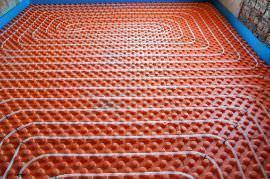 The issue was resolved with the use of underfloor or wall heating systems, which are invisible to the human eye and not bulky, while ensuring high levels of home comfort.
The issue was resolved with the use of underfloor or wall heating systems, which are invisible to the human eye and not bulky, while ensuring high levels of home comfort.
Among the types of floor heating the most widespread is certainly the one with radiant panels, which consists of underfloor piping system, within which flows hot water, which transfers heat by conduction to the floor and this, in its turn, transmits it by radiation to the area where it is installed.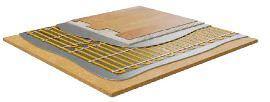 Another type is the electric heating system by radiation, whose installation does not include pipes with water but conductive elements that work electrically.
Another type is the electric heating system by radiation, whose installation does not include pipes with water but conductive elements that work electrically.
Typically the floor heating type is defined more healthy compared to normal radiators, because they do not create air movements and powders and eliminates the temperature differences between the various zones of the environment being the air heated evenly.
In these floor systems the temperature at the feet level is of about 28°C, the environment is then heated by radiation in a homogeneous manner, thus ensuring a constant feeling of wellness.
Types of electric underfloor heating
 The operation of the system is electric, particularly convenient if you use renewable sources for energy, being able to fully convert it into heat.
The operation of the system is electric, particularly convenient if you use renewable sources for energy, being able to fully convert it into heat.
For example, by connecting the system to the photovoltaic panels you can heat the house at a low cost.
You can create floor heating for civil use, defrosting or deicing application, etc.
In the electric floor heating, as well as the company Filmcutter proposes with its product Warmset, the heating element is constituted by two conductors in aluminum or carbon fiber coupled to several films of plastics, exactly superimposed and fully recyclable.
With this system the  performance will be better and you will have a more efficient heat distribution than with the traditional system with radiant tubes.
performance will be better and you will have a more efficient heat distribution than with the traditional system with radiant tubes.
The heating element is in fact a flat conductor with a large heat exchange surface, which occupies about 50-60% of the floor, much of the traditional heating radiant tube that instead have less radiant surface available due to the circular shape, approximately 10-25% of the floor.
The heating membrane has a coil structure and, the reduced distance between the heating elements, allows to transfer the heat uniformly, even when the system is not applied directly under the floor.
Moreover, the material used, the aluminum, is an excellent conductor and transfers heat much more efficiently than other resistive materials.
The installation is very simple, in fact, this coil membrane, stiffened almost to look like a net, can be applied directly under the floor or embedded in any screed.
To control the heating temperature, it will be necessary to make a connection to a thermostat and to the electrical line for supplying the entire system.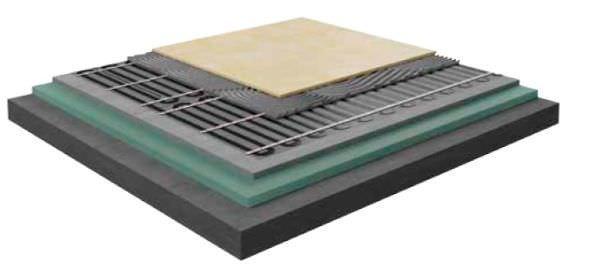
This type of system is compatible with several floors, including porcelain, ceramic tile or stone, parquet and laminate, resin and carpeting.
Moreover, given its reduced thickness of 2.5 mm, it can also be used where it is not possible to remove the existing floor, allowing you to place the heating membrane directly above the old floor then to cover it with the new one, or restructuring, where the space available for new plants is very low.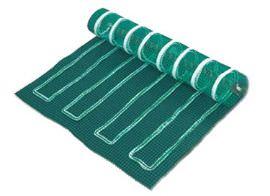 Another company that offers the system of electric underfloor heating is the THERMAL TECHNOLOGY®, which proposes a roll-up network which has a thickness of 4mm and can be tailor made for both power and geometric form, reaching a maximum area of 25m² or standard modules.
Another company that offers the system of electric underfloor heating is the THERMAL TECHNOLOGY®, which proposes a roll-up network which has a thickness of 4mm and can be tailor made for both power and geometric form, reaching a maximum area of 25m² or standard modules.
The characteristics of the system are the same. Obviously this heating system is ideal for any type of building: detached houses, apartment buildings, schools, hospitals, warehouses, new construction or renovation.
Pros and cons of electric underfloor heating
The advantages are numerous, the plant is in fact:
Comfortable: the heat spreads evenly from floor to ceiling, with uniform temperature and constant on all of the different local areas, it is easily adjustable room by room.
 Silent: The system is directly connected to the electrical panel and it works without boiler or other mechanical element that could disturb the peace of the environment.
Silent: The system is directly connected to the electrical panel and it works without boiler or other mechanical element that could disturb the peace of the environment.
Flexible: Each room is equipped with an independent thermostat to adjust the temperature according to the time you spent in each room and thereby removing pipes, pumps and valves.
Healthy: thanks to the principle of non-irradiation the air masses are not moved, but the bodies are directly heated, thus avoiding the circulation of dust and mites. The radiant heating system ensures a difference in temperature between floor and ceiling of about 1.5°C, a value that allows to obtain a good comfort.
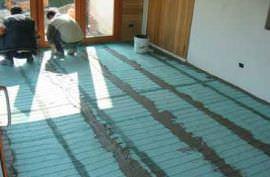 Safe: the system is integrated in the floor, so there is no possibility of direct contact with live parts.
Safe: the system is integrated in the floor, so there is no possibility of direct contact with live parts.
The heaters are made of fireproof materials.
No maintenance: there is no need to perform any maintenance except for the replacement of parts of the same.
The electric floor heating system is definitely more advantageous of the traditional heating systems, always, however, if used in appropriate situations.
In fact it is cheaper than a gas plant and it can predict costs.
The electrical system should be dimensioned according to the subfloor installation environment. In the case of an undersized system, failing to reach the temperature set on the thermostat, it tends to remain always on, so you will have a plant that will cost less but that will result in higher consumption and cold environments. In case the system is oversized obviously the cost of installation increases, but, on the contrary, the response times for the heating of the environments are more controlled.
In case the system is oversized obviously the cost of installation increases, but, on the contrary, the response times for the heating of the environments are more controlled.
You should also know that in the case of underfloor heating the screed thickness plays a crucial role: the thicker screeds involve a greater response time, effect similar to cast iron radiators.
A thinner screed implies the opposite conditions: a prompt response and faster heating and cooling just as fast, but always in relation to the rooms insulation.
79735 REGISTERED USERS










